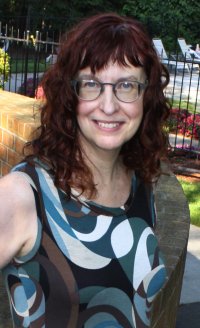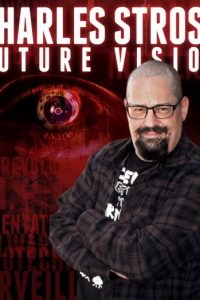Delia Sherman: Historical Dimensions
 Cordelia Caroline Sherman was born in Tokyo, Japan, and grew up in Manhattan. She attended Vassar, then earned her MA and PhD in Renaissance Studies at Brown University. She has taught at the university level, including at Boston University and Northeastern University. She has also taught numerous writing workshops, including Clarion and Odyssey, among others.
Cordelia Caroline Sherman was born in Tokyo, Japan, and grew up in Manhattan. She attended Vassar, then earned her MA and PhD in Renaissance Studies at Brown University. She has taught at the university level, including at Boston University and Northeastern University. She has also taught numerous writing workshops, including Clarion and Odyssey, among others.
Sherman began publishing SF with story ‘‘Runner Beans’’ in 1985, and many of her early stories were reprinted in Year’s Best anthologies. On the strength of those stories and first novel Through a Brazen Mirror (1989) she was a finalist for the Campbell Award for Best New Writer in 1990. Historical fantasy The Porcelain Dove (1993) won a Mythopoeic Award and was a New York Times notable book. She co-wrote The Fall of the Kings with Ellen Kushner (2002), set in the world of Kushner’s Swordspoint. With Changeling (2006) Sherman turned to writing for children, continuing with sequel The Magic Mirror of the Mermaid Queen (2009). Standalone time-travel fantasy The Freedom Maze (2011) won the Andre Norton Award, the Prometheus Award, and the Mythopoeic Award.
She has co-edited numerous anthologies, including The Horns of Elfland (1997, with Ellen Kushner & Donald S. Keller), The Essential Bordertown (1998, with Terri Windling), Interfictions 1 (2007, with Theodora Goss), and Interfictions 2 (2009, with Christopher Barzak). Sherman has served as a judge for various awards, including the James Tiptree, Jr. Award and the World Fantasy Award, co-founded the Interstitial Arts Foundation, and has served on the Motherboard of the Tiptree Award.
After spending more than 30 years in Boston, she returned to New York in 2006, where she lives with her wife Ellen Kushner.
Excerpts from the interview:
‘‘I always read fairy tales. My favorite books when I was growing up were things like Fairy Tales of Many Lands, published in the 1950s, that I just read over and over and over again, along with Andrew Lang’s Fairy books, and Nathaniel Hawthorne’s Tanglewood Tales. They just spoke to something in me. I didn’t think of fairy tales as metaphors, and I didn’t know if they were real or not real – that was just where I lived, in that world of very clear moral choices. I liked it that the morality in some of the stories changed: there are some times when you have to be curious, and sometimes if you’re curious you get eaten by the dragon. In a way, fairy tales reflected the unknowable world around me.”
…
‘‘The Freedom Maze took 15 years to finish because when I started out I didn’t know I was writing a children’s book. I was pacing it much too slowly. I had written The Porcelain Dove, which is paced like an 18th-century novel, and is 600 pages long. It doesn’t move fast, and when you’re writing for teenagers or middle grade, you have to have a plot that moves right along. You can’t let structure  stand in for plot, which I have been known to do. So I had to learn how to focus on a close third person narrator who did a lot of thinking and a lot of reacting, but who didn’t always know what she was reacting to. It was also hard to remember what that 1960s racial world view was like, and how to have her live in that world and not be completely hateful, especially since she’s Southern. I was also working on The Porcelain Dove at the time, so I put The Freedom Maze aside to finish The Porcelain Dove, picked it up again, got stuck in the middle, and didn’t go back to it for a long time. I was working on my craft in other books, and teaching, and having a life.
stand in for plot, which I have been known to do. So I had to learn how to focus on a close third person narrator who did a lot of thinking and a lot of reacting, but who didn’t always know what she was reacting to. It was also hard to remember what that 1960s racial world view was like, and how to have her live in that world and not be completely hateful, especially since she’s Southern. I was also working on The Porcelain Dove at the time, so I put The Freedom Maze aside to finish The Porcelain Dove, picked it up again, got stuck in the middle, and didn’t go back to it for a long time. I was working on my craft in other books, and teaching, and having a life.
‘‘I had a horrible time with The Freedom Maze for political reasons as much as anything else. I realize, now that I look back on the version that I was shopping around originally, it was a good book, but the publishers were right to turn it down. Even though they were turning it down for the wrong reasons, I’m glad they did, because I learned a great deal in the interim, and research material became available to me that was not available in the early 1990s. I finished what I thought was a final draft in 2002 or 2003, and then I wrote another three drafts. There were details I found that didn’t really change the story, but changed the background, and the way I dealt with it.
…
‘‘One of the things I found in my research was that people back then really believed in magic. Up until the late – well, up until now, really – there are still people who believe in magic and practice it as a religion. Looking back on history with a modern brain, and saying magic didn’t exist doesn’t do much good. They believed in magic, and they behaved as if it worked, and possibly sometimes it did. I don’t know; I wasn’t there. I prefer to write history with the magic left in. The magic that I write about is the magic that people believed in.
‘‘I’m about to start researching for my next book, which is set against the background of the Depression in New York. It begins right before Black Monday and goes on for a few months afterwards. I’m researching that period, and the Yiddish theater. The plot will take my characters down to the Lower East side. What are you going to do? It’s the theater, it’s Yiddish, it’s good. There was a large Jewish orphanage about which there’s a lot of research available, and of course I’m going to be writing about orphans and foundlings. Even though the story is based on Hansel & Gretel, I don’t know if it will have any magic in it. I’ll find out.”
…
‘‘I’ve got some other books I want to write. It’s a question of which ones I fall in love with, and which ones anyone wants. I’m not as young as I used to be. I take more chances with my short fiction because it’s not such a huge investment of time and energy. I approach writing more professionally than I once did – it’s not like I have all the time in the world, and it doesn’t matter what I do next. It does. I know if I keep my marbles for another 20 years I’ll be doing well. So I need to have some discipline, and sit down and write when I don’t feel like it.’’



 Read the complete interview, and biographical profile, in the
Read the complete interview, and biographical profile, in the 


